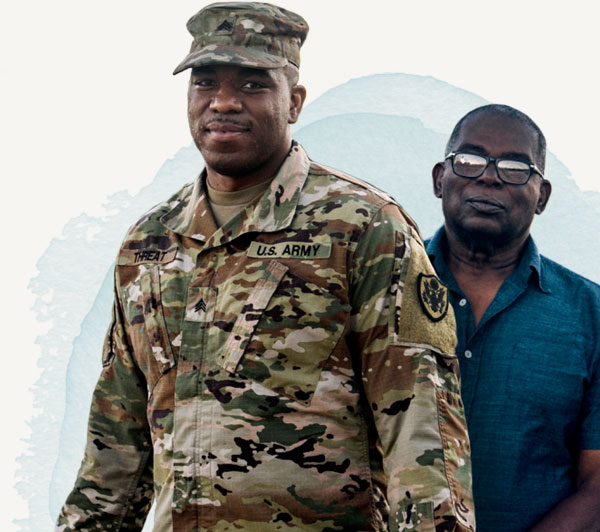Army senior leaders put the focus on families
US Army | Oct. 14, 2022

WASHINGTON: As the Army moves forward with transforming for the future, senior leaders at this year’s annual meeting of the Association of the U.S. Army made clear that taking care of Army families is their central focus.
During a town hall panel, Secretary of the Army Christine Wormuth, Chief of Staff of the Army Gen. James McConville and Sgt. Maj. of the Army Michael Grinston discussed family issues with an audience of Soldiers, family members and civilians.
“If we don’t have the best people and we don’t take care of our people, it won’t really matter — even if we develop the most amazing new weapon systems and technologies,” Wormuth said. “People are the backbone of this Army, and we have to take care of our folks.”
The Army senior leader town hall meeting was created to provide Army families a way to communicate issues to top leaders, Wormuth said. She has visited Soldiers and their families at many Army installations to hear about issues right from the source.
According to Wormuth, the Army is investing in better housing for Soldiers and their families, building new child development centers and rolling out a new Exceptional Family Member Program website to streamline enrollment.
“We recruit Soldiers, but we retain families,” McConville said. “Eighty-nine percent of our sergeants and above have families. We are far from perfect when it comes to taking care of our families, but this forum — at least for me — has been very, very helpful.”
After their opening statements, senior leaders took questions from the audience that ranged from suicide prevention to housing concerns in and around Army posts.
Suicide Prevention
One of the concerns the Army family has faced in recent years is the stigma associated with seeking help for mental illness.
“I myself have seen a counselor,” Wormuth said. “I try to encourage and try to get the message out that taking advantage of behavioral health resources is a sign of strength, not a vulnerability. It is helping yourself solve a problem, and it is nothing to be ashamed about.”
The Army is making a concerted effort to get behavioral health resources where they are needed. Recently many behavioral health assets were moved Alaska, where the Army was seeing its highest rates of suicide and suicide attempts.
“One of the biggest challenges we have, though, is nationwide we have a shortage of behavioral health resources,” Wormuth said. “One of the biggest things we’ve got to keep working on is trying to increase the capacity of the behavioral health resources available … particularly in our remote locations where it is harder to hire civilians.”
Suicide prevention measures and how to help Soldiers’ families were also discussed.
“If you haven’t visited the Army Wellness Center, they have stress management,” Grinston said. “Sometimes we’re not using all of the resources available. We have these places; we just have to use them.”
“We as leaders have an obligation to build connections between our Soldiers and our leaders, making sure that every Soldier has somebody that cares about them,” McConville said. “Every Soldier’s family knows who they can call when there is a problem.”
Spiritual Wellness
Some of the audience wanted to know more about the connection of spiritual wellness and suicide prevention.
“We’re very comfortable talking physical; we’re very comfortable talking mental. But we get a little ‘squishy’ when it comes to things spiritual,” said Maj. Gen. Thomas L. Solhjem, Chief of Chaplains for the Army and an audience member who spoke about spiritual wellness. “The Army has taken [spiritual wellness] on [as part of] holistic health.”
According to Solhjem, people who are spiritual have significant protection against risk-taking, major depression, and substance dependence and abuse, and they are 50-80% less likely to be suicidal. Solhjem explained that protection against suicidal tendencies is even greater when people have personal faith and believe in something outside of themselves, and when they share it with others.
“When you hear spiritual, your brain thinks religion, and we’re actually talking about two different things,” Grinston said. “Spiritual — do you believe in something bigger than yourself?”
EFMP
The Exceptional Family Member Program is in place to be able to move Soldiers and their families to locations that can support their special needs. Approximately 10% of Soldiers have family members who are part of the program.
“We want to give people the opportunity to serve wherever we can support them serving,” McConville said.
The new updated Enterprise-EFMP, which went live Aug. 31, introduced a faster and more secure way to update a Soldier’s EFMP file. The new system streamlines enrollment and more fluidly assists Soldiers to get assignments that correspond with their families’ needs.
ACS
The Army has experienced budget cuts in recent years, including the Army Community Service program, which caused concern among some Soldiers and family members.
“The services that ACS is providing — one size doesn’t fit all,” McConville added. “What we’re trying to do is get feedback from senior commanders. Which programs are working, which ones do we cut? There are always opportunities to bring them back.”
“We still have the Army Family Action program,” Grinston said. The concern is that although ACS provides many services to an installation, all of the services are not needed at every post. But, if something is needed, Soldiers and their family members can bring it up to be reconsidered.
Soldier for Life
When Soldiers leave the Army, they transition to “Soldier for Life,” and some of them looking ways to give back.
“Soldiers for life — we want you to inspire other men and women to serve,” McConville said. “What we find is 83% of Soldiers who come into the Army come from military families. We have to do all we can do to expose our Army to the American public. Encourage them to serve, because there is no better place to be all that you can be.”
Housing
A major concern Soldiers and families often have is getting a place to live when they arrive at a new unit. Some have noted that renters are charging more than the allotted basic allowance for housing, and that on-post housing may not be available for months at a time.
“We know we have some housing challenges, and we are really trying to work on that,” Wormuth said. “We are really trying to work closely with the privatized companies.”
The Army is also working to ensure it has high-quality maintenance workers to fix problems in a timely manner, she said. The Army is actively trying to fix current housing issues, as well as new ones as they arise.
Approximately 65% of Soldiers and their families live off post, and the Army is aware of the rising prices in housing. As of right now, the Army is looking into how they can make adjustments and calculations to BAH.
“We are committed to giving our families and Soldiers the quality of life they’ve earned,” McConville said.
















